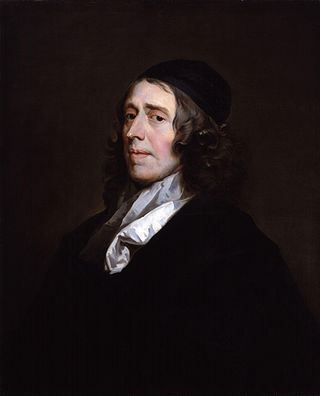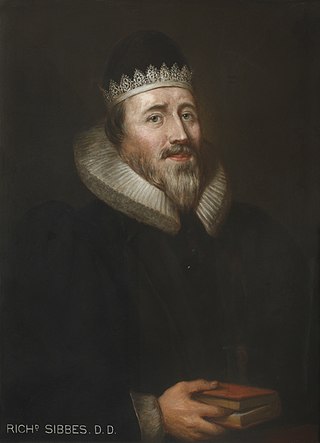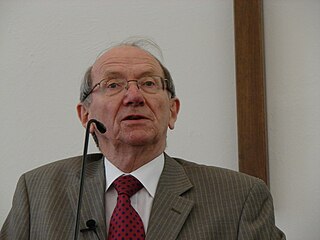Related Research Articles

Calvinism, also sometimes called the Reformed tradition, Reformed Protestantism, Reformed Christianity, or simply Reformed, is a major branch of Protestantism that follows the Christian theological tradition and forms of Christian practice set down by John Calvin and other Reformation-era theologians. It emphasizes the sovereignty of God and the authority of the Bible.

John Owen was an English Nonconformist church leader, theologian, and academic administrator at the University of Oxford.

Edmund Calamy was an English Presbyterian church leader and divine. Known as "the elder", he was the first of four generations of nonconformist ministers bearing the same name.

This page is about a college in Northern Ireland. For institutions with similar names, see United Theological College, Union Theological Seminary and Union School of Theology

Richard Sibbes (1577–1635) was an Anglican theologian. He is known as a Biblical exegete, and as a representative, with William Perkins and John Preston, of what has been called "main-line" Puritanism because he always remained in the Church of England and worshiped according to the Book of Common Prayer.

John Bramhall, DD was an Archbishop of Armagh, and an Anglican theologian and apologist. He was a noted controversialist who doggedly defended the English Church from both Puritan and Roman Catholic accusations, as well as the materialism of Thomas Hobbes.
Churchmanship is a way of talking about and labelling different tendencies, parties, or schools of thought within the Church of England and the sister churches of the Anglican Communion.

Stephen Charnock, Puritan divine, was an English Puritan Presbyterian clergyman born at the St Katherine Cree parish of London.

Iain Hamish Murray is a British pastor and author who co-founded the Reformed publishing house, the Banner of Truth Trust.
Victor Shepherd is a Canadian Presbyterian minister, theology professor and author living in Toronto, Ontario. He is a critic of the theology of the United Church of Canada and acted as an expert witness in a case against the church.

Campegius Vitringa Sr., or Kempe Vitringa was a Dutch Protestant theologian and Hebraist. His youngest of four children was Campeius Vitringa (1693-1723).
John Saltmarsh was an English religious radical, "One of the most gentle tongued of controversialists", writer and preacher. He supported the Covenant and was chaplain in Thomas Fairfax's army. The Dictionary of National Biography describes his theology as "Calvinistic in its base, but improved by practical knowledge of men". William Haller called him that strange genius, part poet and part whirling dervish. He preached Free Grace theology, and published on the topics of Peace, Love and Unity.
Thomas Blake (1597?–1657) was an English Puritan clergyman and controversialist of moderate Presbyterian sympathies. He worked in Tamworth, Staffordshire and in Shrewsbury, from which he was ejected over the Engagement controversy. He disputed in print with Richard Baxter over admission to baptism and the Lords Supper.

The reign of Elizabeth I of England, from 1558 to 1603, saw the start of the Puritan movement in England, its clash with the authorities of the Church of England, and its temporarily effective suppression as a political movement in the 1590s by judicial means. This led to the further alienation of Anglicans and Puritans from one another in the 17th century during the reign of King James (1603–1625) and the reign of King Charles I (1625–1649), that eventually brought about the English Civil War (1642–1651), the brief rule of the Puritan Lord Protector of England Oliver Cromwell (1653–1658), the English Commonwealth (1649–1660), and as a result the political, religious, and civil liberty that is celebrated today in all English speaking countries.

From 1649 to 1660, Puritans in the Commonwealth of England were allied to the state power held by the military regime, headed by Lord Protector Oliver Cromwell until he died in 1658. They broke into numerous sects, of which the Presbyterian group comprised most of the clergy, but was deficient in political power since Cromwell's sympathies were with the Independents. During this period, the term "Puritan" becomes largely moot, therefore, in British terms, though the situation in New England was very different. After the English Restoration, the Savoy Conference and Uniformity Act 1662 and Great Ejection drove most of the Puritan ministers from the Church of England, and the outlines of the Puritan movement changed over a few decades into the collections of Presbyterian and Congregational churches, operating as they could as Dissenters under changing regimes.
Samuel Petto was an English Calvinist, a Cambridge graduate, and an Independent Puritan clergyman who primarily ministered in Sudbury, Suffolk. He was a prolific theologian who made a notable contribution to the development of British covenant theology by describing the link between the covenant of works and the covenant of grace and also demonstrating the relationship between justification and covenant theology. Additionally, he wrote two catechisms and a book advocating lay preaching. He also had close ties with a radical political movement.

Carl R. Trueman is an English Christian theologian and ecclesiastical historian. He was Professor of Historical Theology and Church History at Westminster Theological Seminary, where he held the Paul Woolley Chair of Church History. In 2018 Trueman left Westminster and became a professor at Grove City College in their Department of Biblical and Religious Studies.

Historians have produced and worked with a number of definitions of Puritanism, in an unresolved debate on the nature of the Puritan movement of the 16th and 17th century. There are some historians who are prepared to reject the term for historical use. John Spurr argues that changes in the terms of membership of the Church of England, in 1604–6, 1626, 1662, and also 1689, led to re-definitions of the word "Puritan". Basil Hall, citing Richard Baxter. considers that "Puritan" dropped out of contemporary usage in 1642, with the outbreak of the First English Civil War, being replaced by more accurate religious terminology. Current literature on Puritanism supports two general points: Puritans were identifiable in terms of their general culture, by contemporaries, which changed over time; and they were not identified by theological views alone.
Reformed worship is religious devotion to God as conducted by Reformed or Calvinistic Christians, including Presbyterians. Despite considerable local and national variation, public worship in most Reformed and Presbyterian churches is governed by the Regulative principle of worship.
References
- ↑ "Google Scholar – Martyn Cowan".
- ↑ Cowan, Martyn Cowan (2013). The prophetic preaching of John Owen from 1646 to 1659 in its historical context. University of Cambridge: Unpublished PhD dissertation.
- ↑ "EThOS Record".
- ↑ "Service of Licensing for Martyn Cowan at Railway Street Presbyterian Church".
- ↑ "Presentation to Martyn and Kathy Cowan 11 December 2016".
- ↑ "New Faculty Members for Union".
- ↑ "Fellows of the Royal Historical Society" (PDF).
- ↑ Gribben, Crawford (2018). "Review of Cowan's John Owen and the Civil War Apocalypse". Journal of the Northern Renaissance.
- ↑ "Martyn Cowan's Amazon Author Page".
- ↑ Hyde, Daniel (January 2017). "John Owen: Prayer as Politics By Other Means". Ad Fontes. 5.